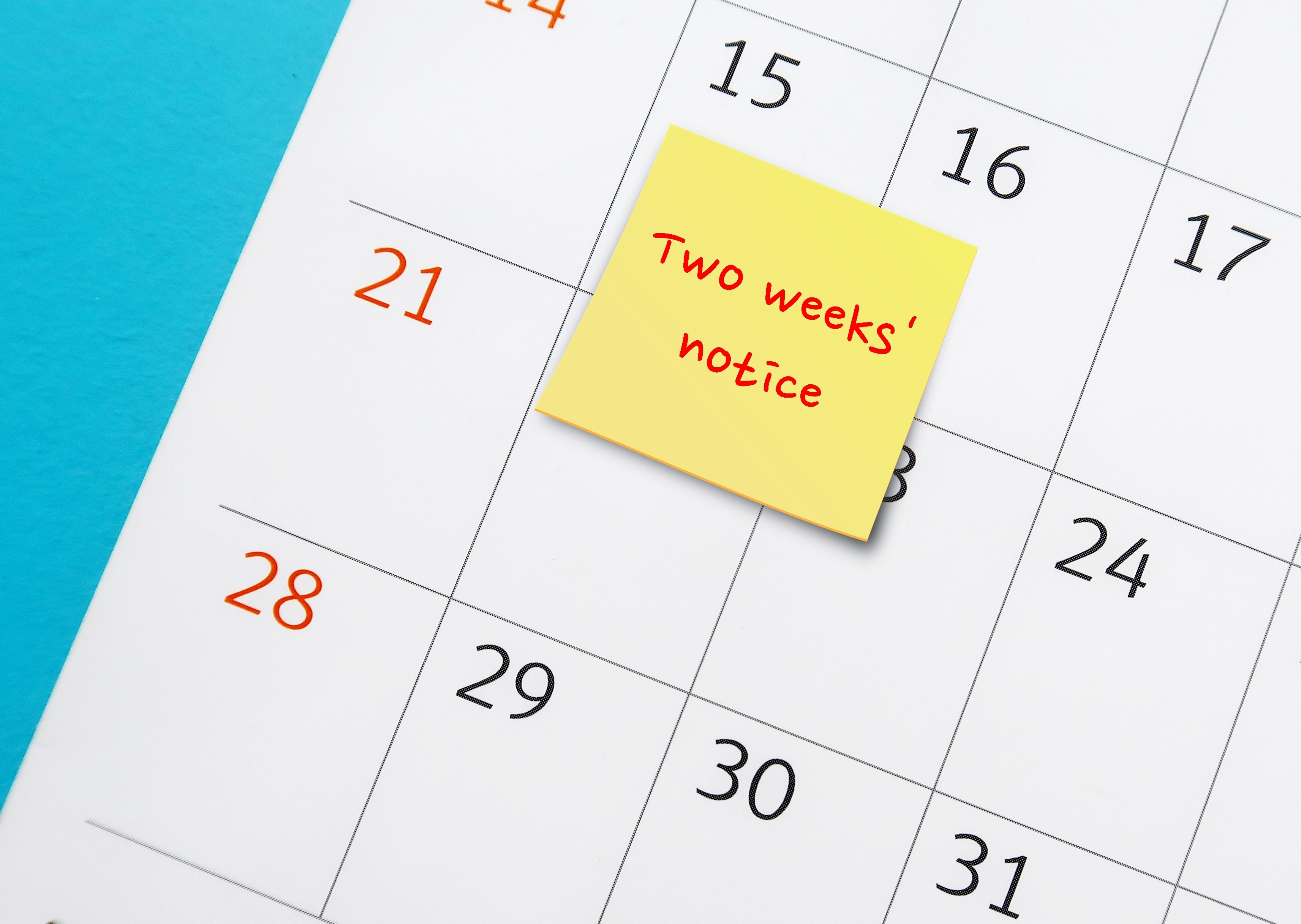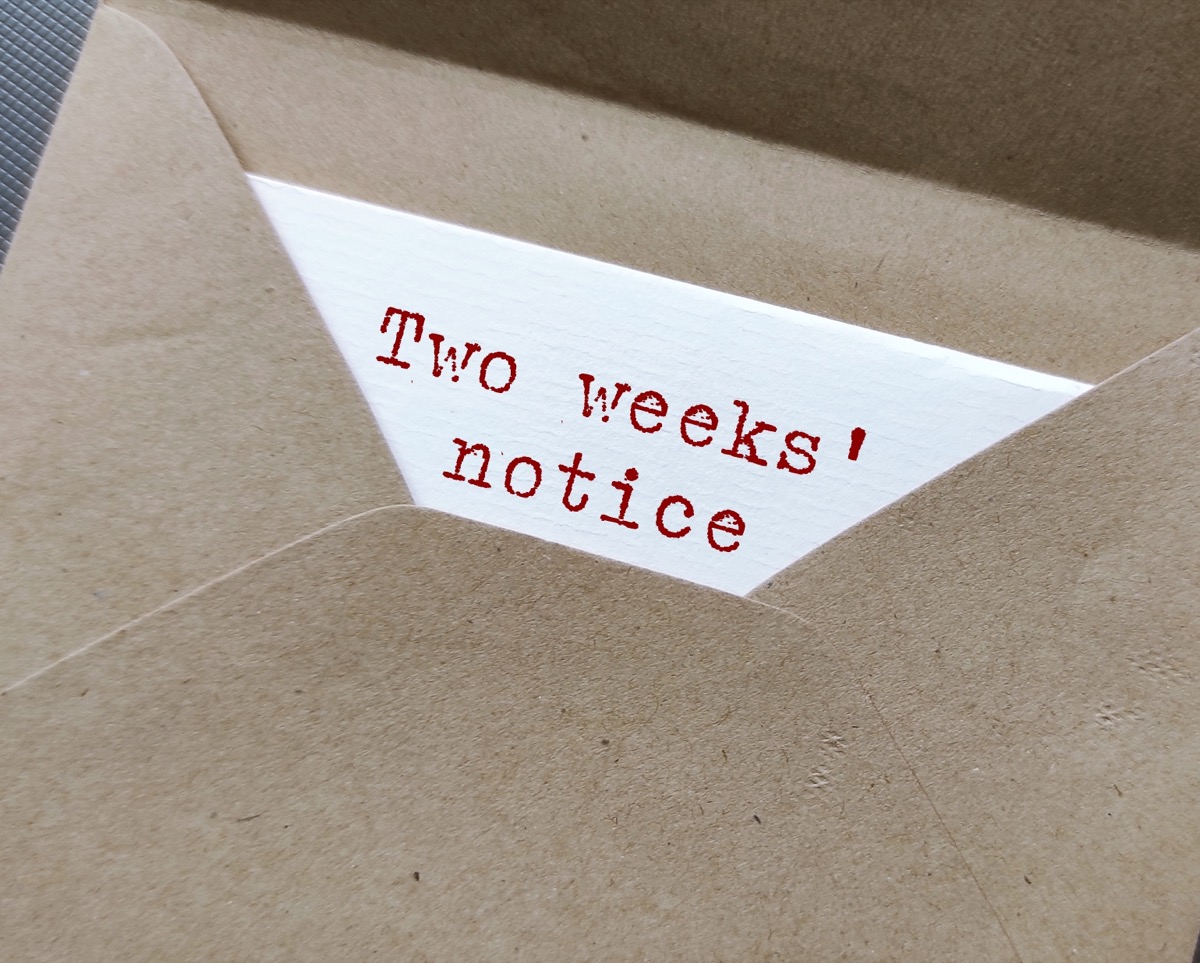How to Write a Two-Week Notice, According to Career Experts

If you plan on quitting your job, giving proper notice isn’t just a formality—it’s an opportunity to leave a lasting impression on your former employer. In today’s ultra-connected world, that’s more important than ever. Not only can making an ungraceful exit burn bridges but there’s also a decent chance that your future employer could hear about it. That’s where knowing how to write a two-week notice comes in. Experts say it’s crucial to take this step to avoid confusion, offer closure, and finish out your role in good faith.
“By adhering to some simple guidelines, you can ensure a professional and respectful departure from your current role, paving the way for continued success in your future endeavors,” says Amy Thomas, founder and human resources expert at Horizon Business Service.
Read on for employment experts’ best tips for crafting your resignation letter—and protecting your professional relationships in the process.
RELATED: How to Accept a Job Offer, According to Career Experts.
Why you should give your two-week notice

Just as first impressions are important for growing your career, so are your last impressions. Experts say that regardless of your reasons for leaving your position, it’s always a good idea to make a courteous exit by giving proper notice.
“Giving a formal two-week notice shows respect for your employer and your time working with them. It allows for a smooth transition, giving you time to pass on your knowledge and helping the employer to backfill your position,” explains Caitlin Wehniainen, a staffing and recruitment expert at On Cue Hire.
“A formal statement, both written and followed by a meeting with your direct supervisor, demonstrates that you are conscientious about your career. It also enables you to leave on good terms, making it easier to use your supervisor as a professional reference in the future,” she tells Best Life.
Does a two-week notice always have to be in writing?
Though it’s not universally required, submitting a written two-week notice is strongly recommended, says Thomas.
“It provides a clear, documented record of your intent to resign, ensuring there are no misunderstandings. It also ensures that your resignation details, such as your final working day, are explicitly stated, avoiding potential confusion,” she explains.
RELATED: 5 High-Income Skills to Boost Your Career Prospects.
6 tips for writing a two-week notice letter
1. Provide adequate notice.

As a rule of thumb, two weeks is customarily considered enough time for your employer to begin the transition to your departure. However, Thomas points out that some employment contracts or company policies mandate a longer notice period and that ignoring this could reflect poorly on you as you leave your position.
“Always aim to provide the full notice period unless extenuating circumstances prevent it. Non-compliance could lead to negative repercussions, such as forfeiture of accrued benefits,” she tells Best Life.
Matt Collingwood, founder and managing director at VIQU IT Recruitment, says it’s important to factor in that you may not hand in your two-week notice letter on the day you write it.
“Make sure you have worked out your last day correctly based on your notice period, and clearly state the date of your last working day. It would be unfortunate if there is any confusion over your last day and either party becomes annoyed and frustrated with the other,” he says.
2. Keep it clear and concise.

Thomas notes that it’s also important to use clear and concise language so your message is properly received. She suggests opening your letter with something like the following: “I am writing to formally submit my resignation from my position at [Company Name], effective two weeks from today, [Last Working Day].”
“Articulate your intention to resign and include the effective date of your resignation. This eliminates any ambiguity about your departure,” Thomas says.
3. Express gratitude.

Even if you’re leaving under less-than-ideal circumstances, it’s always a good idea to express gratitude for the opportunities you were given or the relationships you built.
“Acknowledge the opportunities and experiences you have gained. This leaves a positive impression and demonstrates your appreciation,” says Thomas.
RELATED: 10 Resume Tips to Help Your CV Stand Out, Experts Say.
4. Maintain a professional tone.

When it comes to giving your two-week notice, what you say and how you say it are of equal importance.
“Use a formal and respectful tone throughout the letter. This reflects well on your professional demeanor. At the very least, remain neutral,” advises Thomas.
5. Offer assistance during the transition.

Your employer might be surprised by your decision to resign, but you can ease the atmosphere by offering to help with the transition process.
“This gesture reflects your commitment to ensuring a smooth handover,” says Thomas. For instance, she suggests saying something like: “I am committed to ensuring a smooth transition and am willing to assist in training and transfer of my responsibilities.”
6. Follow up with an email.

If you hand your employer a physical two-week notice letter, it’s a good idea to follow up with an email so that you have a digital record of your communications.
“Write a short email stating that you have given your notice via letter,” advises Collingwood, adding that you should also include the date that you submitted the letter to your advisor. “Doing both of these things ensures that there is evidence of the fact your notice was given and when.”
This is a good opportunity to request a meeting to discuss your transition plan in person. “This shows professionalism and helps ensure a smooth handover,” notes Wehniainen.
RELATED: How to Ace Every Common Job Interview Question.
Two-week notice letter templates

Looking for a two-week notice template? Wehniainen says these three drafts make good starting points. You can simply choose one and fill in your information or give it a personal slant. Either way, be sure to include your company name, company address, current position, the date of your resignation, your intended last day of work, and your signature.
Template 1
Hello (Supervisor Name),
I’m writing to inform you that I am resigning from my position, and my last day will be (date). Thank you for the opportunity to work here.
I would like to request a meeting to discuss my transition plan and answer any questions. Here are a few days and times I’m available this week (provide your availability).
Thank you again for the opportunity to serve as (your title). I will always think fondly of my time here, and it has been a valuable experience for me.
Best,
(your name)
Template 2
Dear (Supervisor Name),
I am writing to formally resign from my position at (Company Name). My last day will be (date). I appreciate the support and opportunities I have received during my time here.
Please let me know when you would be available to meet and discuss my transition plan. I am committed to ensuring a smooth and efficient transition.
Thank you once again for the experience and guidance.
Sincerely,
(your name)
Template 3
Hi (Supervisor Name),
I am resigning from my position at (Company Name), with my last day being (date). Thank you for the opportunities and experiences I have had here.
I would like to schedule a meeting to discuss my transition and how I can assist in the handover process. Here are a few times I am available this week (provide your availability).
Thank you for everything.
Best regards,
(your name)
RELATED: How to Set Boundaries at Work.
Common mistakes to avoid when giving your two-week notice

Don’t leave on a negative note.
It may be tempting to explain what led to your resignation, especially if the circumstances left you feeling sour. However, “this can burn bridges and harm your reputation,” cautions Lauren Winans, CEO and principal HR consultant at Next Level Benefits.
Instead, she recommends avoiding negative language or criticism of the company and colleagues. Maintain a positive—or at least neutral—tone if you’d like to preserve your working relationships.
Don’t be blindsided by an immediate departure.
Just because you’re offering two more weeks of your time doesn’t mean your employer will necessarily want to keep you on after you’ve resigned.
“Be prepared for the possibility that your employer might ask you to leave immediately. Ensure you have removed personal items and prepared any necessary documentation before giving your notice,” suggests Thomas.
Don’t CC anyone.
If you’re planning to send a two-week notice email, Wehniainen recommends against sending a group notification. This may be viewed as going over your advisor’s head and can complicate communications moving forward.
“Only send your letter to your direct supervisor, no CCs necessary. Do not escalate your resignation letter to the C-level unless that is who you report to,” she says.
Don’t ignore company policies.
Before you hand in your resignation letter, it’s a good idea to do your homework on anything that might affect your notice period or quitting procedures.
“Familiarize yourself with your company’s resignation policies. Some organizations may have specific requirements or procedures that you need to follow when submitting your notice,” Thomas says.
Conclusion
If you’re ready to move on from your current position, crafting a thoughtful two-week notice letter or email can help you leave on a high note.
Keeping it short and simple is key: State your intention to resign, share some words of gratitude, indicate a willingness to help with the transition, and request next steps, such as a follow-up meeting to discuss the details. Maintain a positive tone that demonstrates professionalism and warmth, and make it clear that you value the relationships you’ve cultivated in the workplace.
Of course, once you’ve submitted your letter, all that’s left is to follow it up with action. Remember that how you conduct yourself in your last weeks as an employee will be memorable to your team—so it’s a good idea to give it your best until you’re officially released from the position. Then, onwards and upwards!